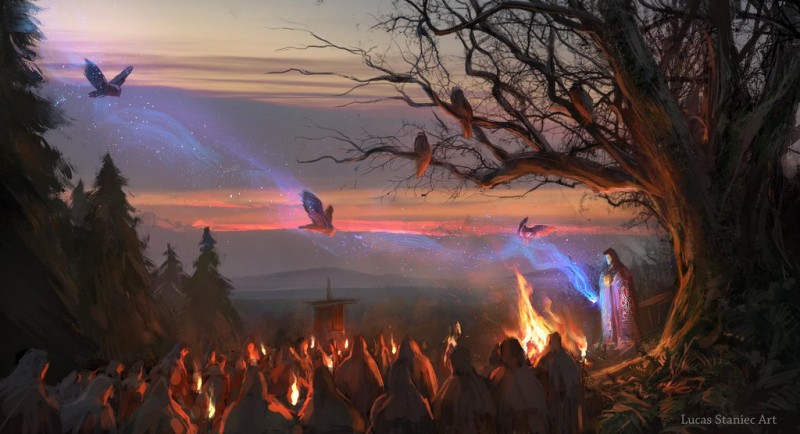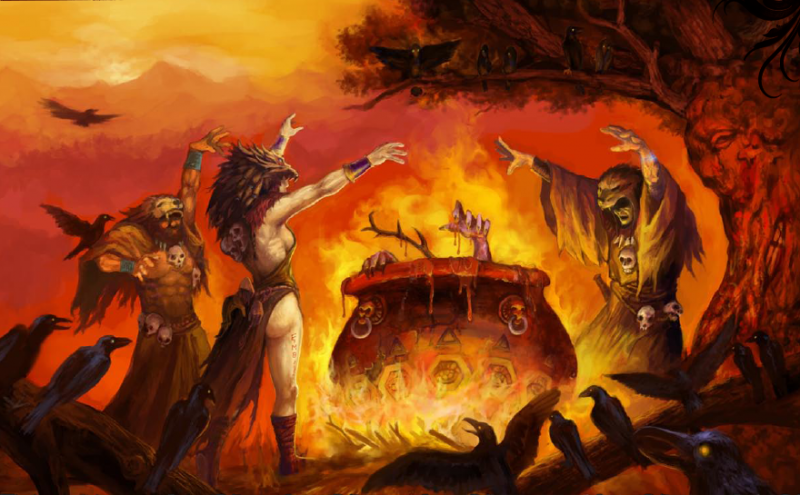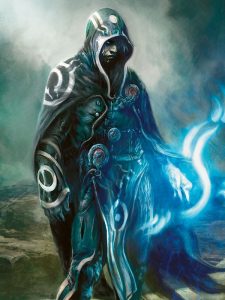One aspect of fantasy worlbuilding that I’ve always been struggling with, other than naming things, is the entire aspects of gods and religion. Which I think I am not alone with. I noticed several years ago that most fantasy settings, especially for RPGs, usually tend to have a lot of gods, but no traces of religion. Having a number of gods with names, areas of influence, and perhaps even iconography does not make religions. What do people actually believe? What do they do? How do faith and the gods actually impact life and society? And most importantly, how does it come up in play? The only case I can think of as actual religion in a fantasy world is the Chantry in Dragon Age, and that’s pretty much Christianity with slightly altered window dressing.
For Kaendor, one of the themes that I like to have well integrated at the foundational level of the whole setting, is the idea that in this world, people are not at the top of the food chain. They are not made in god’s image and they are not made the masters of the natural world by divine decree. Some ways in which this manifests is that most of the world is uninhabited and barely explored, that there are ruins of inhuman civilizations that were much larger and more powerful than society in the present, and that there are many huge beasts and strange spirits which will simply crush any people who don’t get out of their way fast enough. Nature does not care about the concerns of people, and in the end it always wins in every contest about control and mastery of the environment. I feel that this aspect also needs to be very visible in the relationship of the people with the divine powers, and that acceptance of that position in the natural hierarchy needs to be central to the religious beliefs.
 Since it is central that people are not created in the image of gods and are not in any way comparable to gods, the gods can not factually have the appearance of a person. I think even depictions of a deity as a person should be rare and untypical. Maybe have depictions of important events in which the divine influence of the deity is represented by a radiant figure appearing in the background or handing something symbolic to an important mortal hero? But no stories of gods walking among people in humanoid form and having conversations with them. Instead, I think gods should primarily be cosmic forces. Like the deity of storms, the deity of knowledge, the deity of plant growth, the deity of hunting, and so forth. They are forces that are present and active in the environment and in daily life and that will do their thing that is their nature, regardless of how it affects people and their needs and desires. The gods do not love people. They don’t care about people. They might not even take notice of people.
Since it is central that people are not created in the image of gods and are not in any way comparable to gods, the gods can not factually have the appearance of a person. I think even depictions of a deity as a person should be rare and untypical. Maybe have depictions of important events in which the divine influence of the deity is represented by a radiant figure appearing in the background or handing something symbolic to an important mortal hero? But no stories of gods walking among people in humanoid form and having conversations with them. Instead, I think gods should primarily be cosmic forces. Like the deity of storms, the deity of knowledge, the deity of plant growth, the deity of hunting, and so forth. They are forces that are present and active in the environment and in daily life and that will do their thing that is their nature, regardless of how it affects people and their needs and desires. The gods do not love people. They don’t care about people. They might not even take notice of people.
Religion in Kaendor is not about serving the gods or about hoping for rewards or help from the gods. Religion is first and foremost about not getting in the way of the gods. They are impersonal forces active in the environment regardless of the presence or activities of people. Understanding these forces and what they do is the most important thing to not get accidentally crushed by them. But instead of being fatalistic and simply hoping to evade an inevitable doom one more day, the religion of the people of Kaendor is also about making use of the benefits and opportunities that are created by the actions of these divine forces. Religion is about living with the patterns of nature to avoid the many dangers of the natural world and to make the most of what it has to offer. Religion provides the framework by which people put abstract concepts about the environment and society into concrete actions that they can practice in everyday life. And it is widely understood to be that way by most people. Religious customs and rituals are not things demanded by a deity because it furthers a divine plan or because it pleases its vanity. They are simply sensible things to do.
Religion in Kaendor is less about faith and much more about practice. Which really isn’t that unusual for many great religions throughout human history, though it tends to seem really strange from a Christian perspective, which really is more of an outlier in that regard than the typical norm. Though spirituality does exist in Kaendor, particularly among priests. To many people, the various gods are not simply the abstract, impersonal spirits of natural or social phenomenons. They are also exemplars of different ways to approach life in general. By framing the various problems and challenges of everyday life in the context of growing crops or a hunt, priests believe that it becomes much easier to find the right answers and solution. In that regard, the cults of the various gods are very much like different schools of philosophical thought. With each philosophy claiming that their view of life and the right way of living is being exemplified by the way in which their respective deity manifests itself in the world. Emulating the gods is the path to happiness and prosperity.

Of course, to many people, simply practicing sensible customs or getting well meaning advice from priests on how to reflect on their own troubles and behavior is not the kind of divine aid that they are looking for. What they desire are more personal gods who will listen to their pleas and grant them concrete blessing and rewards for their worship. And there are many powerful beings that are open to such relationships with mortals, though priests would say that these are not true deities. This space is the realm of spirit and demon cults. Cults are very common everywhere where people live. Usually these take the form of small shrines to a spirit of a local river, mountain, or ancient tree where people will leave offerings or make small sacrifices to ask for good growing conditions for their crops or protection from predators from the surrounding woods. These gestures of gratitude to local nature spirits typically are practiced side by side with the rituals and ceremonies happening at the main temple of a town or village and might even be officiated by the temple priests on certain holy days.
Much more unusual are cults that take the form of secret societies that practice their own rights completely separate from the temples in private and often hidden sanctuaries. These cults are typically led by a single high priest who is in regular direct contact with the spirit or demon that the cult worships. They bring tribute and sacrifices to their god on the promise of concrete rewards, often wealth and power, and that the god will use its great magic power to help the cult with its earthly goals. Many of these cults have had long relationships with benevolent local spirits that have been of great benefit to their villages. But others have pledged themselves to the service to far more dangerous and insidious beings to further their own selfish malicious plans, often blind to the fact that they are aiding a being much more ruthless than themselves.





